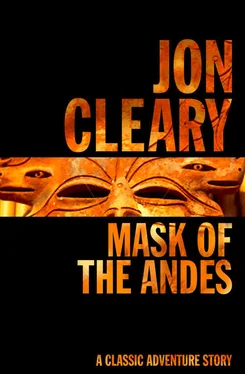Jon Cleary - Mask of the Andes
Здесь есть возможность читать онлайн «Jon Cleary - Mask of the Andes» — ознакомительный отрывок электронной книги совершенно бесплатно, а после прочтения отрывка купить полную версию. В некоторых случаях можно слушать аудио, скачать через торрент в формате fb2 и присутствует краткое содержание. Жанр: unrecognised, на английском языке. Описание произведения, (предисловие) а так же отзывы посетителей доступны на портале библиотеки ЛибКат.
- Название:Mask of the Andes
- Автор:
- Жанр:
- Год:неизвестен
- ISBN:нет данных
- Рейтинг книги:5 / 5. Голосов: 1
-
Избранное:Добавить в избранное
- Отзывы:
-
Ваша оценка:
- 100
- 1
- 2
- 3
- 4
- 5
Mask of the Andes: краткое содержание, описание и аннотация
Предлагаем к чтению аннотацию, описание, краткое содержание или предисловие (зависит от того, что написал сам автор книги «Mask of the Andes»). Если вы не нашли необходимую информацию о книге — напишите в комментариях, мы постараемся отыскать её.
Mask of the Andes — читать онлайн ознакомительный отрывок
Ниже представлен текст книги, разбитый по страницам. Система сохранения места последней прочитанной страницы, позволяет с удобством читать онлайн бесплатно книгу «Mask of the Andes», без необходимости каждый раз заново искать на чём Вы остановились. Поставьте закладку, и сможете в любой момент перейти на страницу, на которой закончили чтение.
Интервал:
Закладка:
‘He didn’t look too friendly,’ he said as McKenna drove down the rutted street. Half a dozen llamas, herded by a small boy playing on a quena pipe, came out of a side alley and McKenna had to brake sharply. The llamas passed in front of them, turning inquisitive heads on their long elegant necks, their soft eyes reproachful; then the small boy went past, his music as melancholy as the day which had now turned grey. McKenna drove on out of the village.
‘I’ve trodden on that priest’s toes a few times. He’s a mestizo – they’re the ones, I find, who can never make up their minds about foreigners.’
‘Half-bloods are the same anywhere. What’s his grudge against you?’
‘I made the mistake of baptizing some of the children for free. He believes in resale price maintenance, I think you British call it. That’s how he makes his living, charging for baptisms and weddings and funerals. He’d starve to death on what the Church pays him up here. It’s damned difficult for me. Most of these campesinos can’t afford to pay for the graces of the Church, but what do I do? Put that guy out of business?’
‘Are the Indians willing to pay?’
‘That’s the irony of it – yes. They’re like the snobs back home in the States – if it’s for free, it can’t be any good.’
A squall of rain came on the wind, shutting out the countryside for a few minutes; then abruptly they drove out into bright sunshine. Taber was learning that this was how the weather was in these high sierras; he would learn, too, that men’s tempers were the same. The altiplano stretched ahead of them, brown and bleak, drawing their gaze till their eyes ached with the stretching. In the far distance herds of llamas and alpaca moved slowly like cloud-shadow in the clear glare, their very insubstantiality adding to the emptiness of the landscape. The rutted road ran straight as a rod for five or six miles, encountering neither fence nor house that would have caused it to bend.
‘This was all Ruiz land at one time,’ said McKenna. ‘You think you could get anything to grow on it?’
‘I’m no miracle worker,’ said Taber, staring unhopefully out at the barren land. ‘But down in Australia they turned a desert into a wheat-field. There’s always the chance—’
‘No point in growing wheat up here. Isn’t there a world surplus? They want a cash crop they can export.’
‘Who doesn’t?’ said Taber, who had heard the same suggestion everywhere he had worked.
The Jeep bumped along the road, seeming to make no headway in the landscape that offered no perspective. Once, some distance off to their left, they saw an Indian woman sitting in the middle of nowhere: no llamas, no alpaca, not even a dog, only she sitting there, a human cairn marking the loneliness.
‘You wonder what they think about,’ said McKenna.
‘Perhaps nothing. If you don’t know anything, what’s to fire your imagination?’
‘You’re mistaken if you think their intelligence isn’t much above the animal level.’
‘I didn’t say that.’ Taber slumped in the corner of the seat, took off his cap and scratched his head. But he did not look embarrassed this time, only sad. ‘But sometimes I think the poor buggers would be better off it that was their level.’
Then the road curved and began to dip and soon they were riding on tarmac. A wide bowl opened up in the altiplano and there at the bottom of it was San Sebastian. The road went down in a series of bends, starting where the airport had been built on the very edge of the bowl. As they passed the airport an old DC-3 took off, already airborne 2,000 feet as it left the end of the runway and flew out over the city. The Jeep went down round the bends, came to a level where a thin forest of Australian red gums grew on each side of the road.
‘They were planted by the British, when they owned the railroad,’ McKenna said. ‘The early locos were wood-burners.’
‘Those gums look pretty good. Why don’t they try planting some up on the altiplano as windbreaks?’
McKenna shrugged. ‘The people down here don’t care what happens up there. The Indians have been wind-blown for centuries – why change it? Even the Indians themselves seem to have the same idea. I‘m trying to get a few saplings going in back of my place, but the Indians just look at them and shake their heads. I’m the nutty one, not them.’
A ramshackle truck, loaded high with a mixed freight of crates, tyres and half a dozen Indian women perched high on top like a covey of coots, went rattling by, its brakes shrieking as it came to a bend but doing nothing to decrease its speed. Somehow or other the driver negotiated the curve, going with-in a foot of the edge of the road and a thousand-foot drop, then tearing on towards the next bend. Taber and McKenna looked at each other and shook their heads. There was nothing to say: each of them had seen the results of such decrepit trucks and such drivers.
The road straightened out, became the main street of the city, running through to the main plaza. The traffic thickened: a few modern cars, but most of its cars ten, twenty, thirty years old and trucks that looked even more ancient: to Taber it was like travelling through a big moving junk yard. They swung round the plaza, past the eucalyptuses, the occasional pine and the tall column with the golden condor perched atop it and the boy bootblacks clustered round its base like starlings. They passed the cathedral, baroque as a religious nightmare; gold-leafed saints looked out in agony from niches in the walls; between the two tall domed towers was a minaret, as if the sixteenth century builder, brought here from Spain, had not been able to deny his Moorish blood. They went past a mansion half-hidded behind tall railing gates (‘The Bishop’s palace,’ said McKenna. ‘Whose else?’ said Taber), turned down a side street and came to a smaller plaza. There were no shops or public buildings here; Taber recognized at once that this was a residential plaza and a very restricted one. A fountain dribbled lethargically in the centre of the square and a few Indians sat round it, their backs to it, their blank, indifferent faces staring across at the high walls surrounding the plaza. In each wall was a pair of tall wooden gates, the barriers between two worlds.
McKenna pulled the Jeep up outside the biggest of the gates. They got out and crossed to a small door let into the gates. There were two iron knockers, each in the shape of a mailed fist, one at face level for the caller on foot, one at a level for a caller on horseback: this was a house that had known visitors for centuries. McKenna clanged the lower knocker and almost immediately the door was opened by an unsmiling Indian houseboy. Taber followed the priest in under the massive gates to a courtyard in which stood four Cadillacs, none of them less than twenty years old.
‘Since the revolution,’ said McKenna in a low voice, ‘they don’t advertise their wealth so much here at home. They go to Europe every year – they keep a Rolls-Royce there.’
‘ Four Cadillacs?’ Taber had taken off his cap and was trying to comb his hair with his fingers. Alongside the now spruce McKenna he looked a trifle unkempt. He had a natural contempt for people who concerned themselves with clothes, but he had learned to make concessions to the criollos’ sense of formality. He always carried a tie with him, but today he had left it in the Land-Rover.
‘One of them is the Bishop’s. I don’t know why the Ruiz have all three of theirs out of the garages. Maybe they’re going up to La Paz. They usually take their servants with them – they have a house up there, too.’
‘I think I’d better back out now. Go back to the hotel, come another day when my socialist hackles are lying down flat.’
Читать дальшеИнтервал:
Закладка:
Похожие книги на «Mask of the Andes»
Представляем Вашему вниманию похожие книги на «Mask of the Andes» списком для выбора. Мы отобрали схожую по названию и смыслу литературу в надежде предоставить читателям больше вариантов отыскать новые, интересные, ещё непрочитанные произведения.
Обсуждение, отзывы о книге «Mask of the Andes» и просто собственные мнения читателей. Оставьте ваши комментарии, напишите, что Вы думаете о произведении, его смысле или главных героях. Укажите что конкретно понравилось, а что нет, и почему Вы так считаете.












